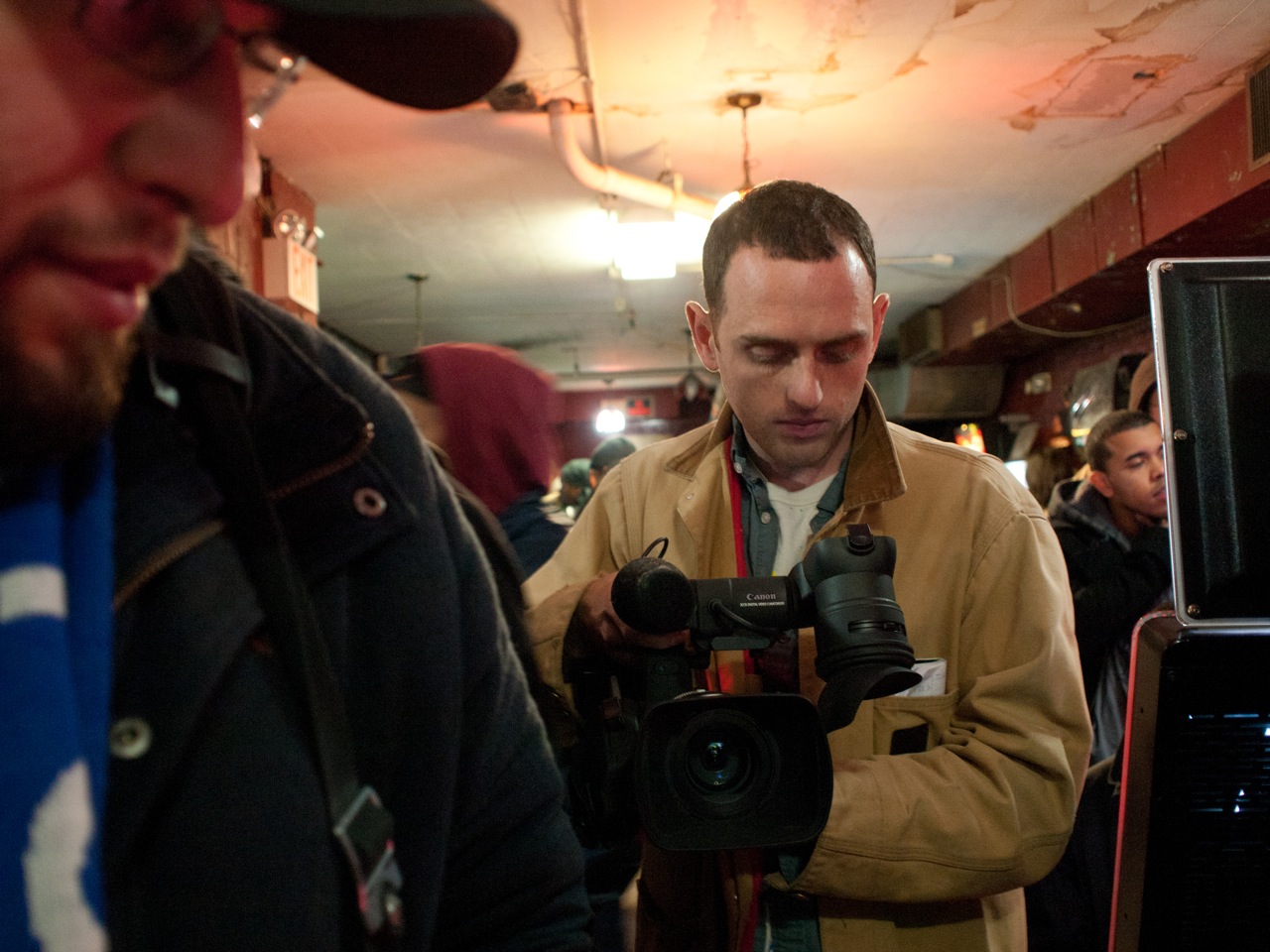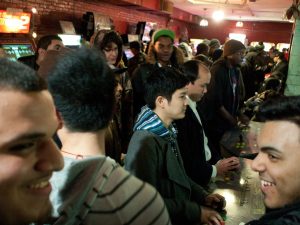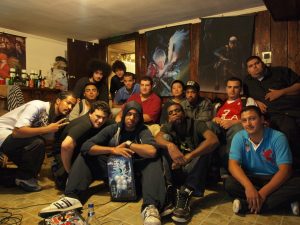The Lost Arcade: Video Games on Film

Courtney Sheehan speaks with Kurt Vincent, about the release of his current documentary
The Lost Arcade is the feature documentary debut of director Kurt Vincent and producer Irene Chin. The film captures the final days of Chinatown Fair, the last video game arcade in Manhattan. It premiered at DOC NYC and had its European premiere at the 45th International Film Festival Rotterdam, where The Independent interviewed Vincent.
Courtney Sheehan: How did you first discover Chinatown Fair and decide to make a movie about it?
Kurt Vincent: One night I was walking in Chinatown with Irene, who’s my partner and she produced the movie and wrote it – we were walking in Chinatown late one night and we literally stumbled upon the arcade and we walked in and it was full of energy and alive and you could just sense something interesting going on. After that first visit we heard a rumor that Chinatown Fair was going to close. We intuitively sensed there was something special about this place so when we heard it was closing we decided to just start filming. That first night we were filming we met a guy named Anthony. He saw us with our camera and was like hey, what are you doing? We said I don’t know we’re just here to see what was going on. He was like, “Alright, let me tell you what’s going on,” and he kind of introduced us to this incredible community of people and the history of the arcade, and from there we just decided to start following the story and that’s how the movie came about it.
CS: Was it a small crew, just you and Irene?
Vincent: At the beginning it was just us two. I had the camera and Irene was with the microphone. And then once we realized there was a pretty good story to be told, we brought on a team. We got some producers, we brought on a better cinematographer than myself, and we went from there.
CS: Did you know from the beginning that you wanted to make a feature length documentary?
Vincent: We went into it not thinking anything, or thinking we would have a short. Actually we thought we’d have a short cinema verité video, you know like the last night of this place. So then once we started meeting people and learned their stories we realized there is an important story to be told here.

CS: How was the New York premiere?
Vincent: The New York premiere was at DOC NYC at the IFC theater, which is a 10 minute walk from Chinatown Fair. One of the reasons we wanted it to premiere in New York is that we wanted the people in the movie to share the experience. So the premiere was packed and it was full of Chinatown Fair regulars, young and old, and quite a few of the characters who were in the movie were there. Including Lonnie, the owner of the new Chinatown Fair, and Henry, the owner of Next Level Arcade. It was pretty interesting. There was a crew of the old Chinatown Fair people from the fighting game community and they were pretty rowdy at certain points. So Lonnie, the owner of the new arcade, at the beginning of his story in the movie he’s taking over this beloved place so he’s an outsider. I think people were very wary of him. When he first shows up and talks about painting the walls and painting over the signatures on the games, a big group of people in the back of the auditorium started booing. Lonnie was sitting up in front with his family and I was like, ‘oh my god, I hope Lonnie doesn’t get up and leave.’ His story is much deeper than just an outsider ruining this place. As the movie unfolds, his character – you see who he really is. I wanted to make sure there was a fair telling of everyone’s story. Lonnie loved the movie in the end and he actually came to the second screening and brought even more relatives, so I was really happy.
CS: Did the audience react to the film the way you expected them to?
Vincent: It sort of played out the way I expected. I knew those guys were vocal and I knew they were going to react viscerally. With Lonnie there I was surprised. I thought he might not appreciate his portrayal in the movie, even though I thought it was really fair and kind, which is the way I feel about Lonnie, he’s a dear friend of mine. But I was worried, so I was pleasantly surprised that he loves it as much as he does. In terms of our own expectations in terms of sharing the movie, honestly it was one of the worst experiences I’ve ever felt. It was so weird and I had so much anxiety and so many friends and family were at the screening. It was this thing that’s so personal to me and Irene. We were working on it for four and a half years and only a few people had seen it. All of a sudden to see it up in front of 300 people, it was awful, I didn’t enjoy it at all. Also the sound wasn’t totally right, we had finished the movie like a week before the premiere, so it wasn’t perfect. You can’t have everything perfect if you finish it just a few days before the premiere. Most of the people wouldn’t have noticed but I noticed every single thing that wasn’t right. It was a horrible experience. But then the second screening was a little better, and then in Rotterdam we had everything fixed by then so it looked and sounded perfect and I loved it, it was a lot more fun to share.
CS: How was the European audience experience of the film different?
Vincent: It was a totally different experience. Most of the people in the Rotterdam crowd were older than I expected. In New York there were a lot of teenagers and early 20 year olds. In Rotterdam it was generally 30,40 and even 60 year olds and most of them weren’t gamers either so it was really interesting to see how they reacted. It was received really well. I even think at Rotterdam it was better received than at DOC NYC.
CS: What has been the weirdest question you’ve heard or the one that most caught you by surprise or made you think?
Vincent: What comes to mind is a question a woman asked me after I was talking about some of the elements of the story that didn’t make the movie. Primarily, the fact that Chinatown Fair was a haven for the lesbian, gay, bi, and transgender community. It was something I really wanted to put in the movie but it just didn’t fit in…There’s just so many interesting things but a lot of it couldn’t all make it in the movie. She was kind of like, ‘why didn’t you make that movie?’ And I was like well, I kinda didn’t know how to answer. It’s like I guess just because it was a failure on our part?
CS: Documentary makers can be treated like ambassadors of a topic, so their films are expected to be exhaustive, comprehensive documents of a subject.

Vincent: I gave a very distinct answer, it was something along the lines of, “it just wasn’t the movie that formed.” It was more of a intuitive organic process. DOC NYC is definitely more traditional documentary style. Our movie is kind of weirder and more personal and it’s definitely not journalism. In the beginning we did try to fit everything in and so many details, especially about the fighting community and competitions. That probably would have been a more popular movie with the hardcore gamers but being a non gamer, we were really drawn to..obviously gaming is an integral part to the arcade community. The community wouldn’t exist without the games. But the story we were trying to tell was much more about a universal personal story, and that’s what we connected with.
CS: The style of the film is interesting. The visual aesthetic is lyrical or even ethereal at times, and it’s suffused with the neon lights and electronic vibe of the arcade: everything from the music to the machine themselves. How did the style evolve?
Vincent: It came from the early decision that we didn’t just want to produce a journalistic piece that would be a chronological history of this place. We wanted to create a piece of cinema that had atmosphere and a sort of emotional …that gave you the feeling of Chinatown Fair, downtown New York and the energy of the place and the people. That’s what drew us to the story. When we walked into that arcade, we felt something.
CS: Have people responded to the film with similar stories about beloved places/businesses that have been lost?
Vincent: We’ve only showed the film a few times so I haven’t gotten too many stories, but an interesting one was from Jake Perlin, who is the director of the Metrograph theatre, the new cinema in NYC. He told me that for him the lost arcade was cinema. For him the cinema has been a safe place and a community. I think in opening the Metrograph he is trying to create a place for people to gather around movies and have a chance to find a community. I think it makes sense. I see how movies stand in for the games, the theatre stands in for the arcade space. It totally works. At Rotterdam all the cinemas have these incredible places to hang out. Either cafes or bars in the theatre. All day and night I saw people hanging out before and after movies. Drinking coffee or beer. After one of our screenings of the movie at Cinerama, Rotterdam’s great old cinema, we walked out to find a band playing music, and people just hanging out. So Irene and I sat down and talked. It was so nice and I want to be able to do that here in NYC.
CS: Do you see the story as connected to other examples of dying technological formats or pop cultures?
Vincent: Yeah, from the beginning we saw this was a part of the story of culture and society moving towards digital and online existence. There are so many examples of how people are drifting apart even though we are more connected than ever Since there is not a lot of money in the arcade business now you have dedicated and passionate people that are going to own an arcade. I think it’s probably a similar case for record stores and bookstores, and maybe cinemas.
The story isn’t just about the death though. I think it’s more about the evolution of arcades and video games. When Henry gets Next Level open and the community begins streaming the weekly tournaments and all of a sudden 8,000 people are watching, I saw that as a step forward. It’s bringing people together online and in the real world. I think more and more things will be moving that way.
CS: The film is available for preorder. What’s your distribution plan?
Vincent: We don’t know yet. Everyone has a different opinion about how to release the movie. Do we go with a traditional distribution company or do we self release it or do we do a hybrid? It’s confusing and this is our first time tackling this. It’s a really crazy time for independent film distribution. I’ve talked to more than a few doc filmmakers that made more money self-releasing their movie than going with a distribution company.
CS: Is Next Level up and running?
Vincent: Next Level has been open and doing fine. They had a rough period and added competitive card games like Magic to make more money and a community of players has grown there. There hasn’t been a big fighting game in a long time so the upcoming Street Fighter 5 is a big deal. The scene really needs good new fighting games to stay relevant. It’s a catch 22 really. The industry says they don’t produce games for the arcade business because there are no arcades. Arcades need good games to stay in business. So I really hope the industry – or perhaps the indie game world recognizes there is a need for good competitive games for arcades.
CS: What’s next for you and Irene?
Vincent: We are working on getting our second film setup. We have a nonfiction project in the making and one narrative. So hopefully we will be back at Rotterdam soon.
